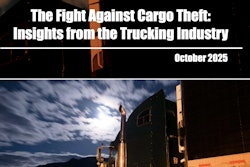
2024 was one heck of a year ... and that's putting it mildly.
Change was rampant in many segments of the trucking industry. Business conditions, for most, sagged badly, but carriers and drivers continued to meet the goals of shippers. Numerous trucking companies succumbed to financial pressures and declared bankruptcy, and a number of carriers bought or merged with others.
Trucking got caught up in the presidential election, natural and manmade disasters, and the push to convert trucks from diesel engines to battery electric propulsion. Progress was made using autonomous trucks to deliver freight on a regular run in Texas. A new report by the National Academies of Sciences, Engineering, and Medicine called in to question something many in the industry have seen as gospel for many years: there is a crushing lack of truck drivers.
As 2024 fades into 2025, here are the top stories we reported in Truckers News during the last year.
Freight Recession
Trucking is, as most analysts like to say, a cyclical business. There are periods of ups and downs. Trucking in 2024 -- and for a goodly amount of time before it -- was in one of those down periods. In fact, most called it a "freight recession." Why? Simply put, there were too many trucks chasing too little freight. As a result, shippers could push carriers for, and usually receive, lower than normal rates. There were too many trucks (and drivers) because during the COVID-19 pandemic, freight was plentiful as people stayed home and shopped online. As a result, a number of drivers bought trucks and chased that plentiful freight for decent rates. Conditions driven by the pandemic cooled and the industry was left with more trucks and drivers than was now needed. Late in 2024, some industry observers said rates had gone as low as they could and the only way was up. Others, however, said the industry ought to be prepared for the freight recession to continue at least through the first half of 2025.
Cargo Theft
Cargo theft was rampant in 2024, continuing a trend from the year before. During the first half of the year, cargo theft increased by 49% over the same time in 2023. CargoNet has predicted there will have been some 4,000 cargo thefts last years. Driving the increase appears to be well organized crime groups that use numerous technological schemes, such as phishing to access carriers' accounts and and secure loads that never get delivered. At the same time, there has been a surge in individuals or small groups accessing parked and sometimes unattended tractor-trailers and stealing what they can fit in several SUVs. Southern California, Texas, Chicago and Memphis continue to be the most active locations for cargo thieves because those locations have lots of freight activity. Experts suggest cargo theft activity from 2024 to carry over to the new year.
Parking & The Economy Were Top Issues
For drivers, their top issue of concern was the lack of safe and secure parking. For the carriers they drive for, it was the state of the economy that topped their list when the American Transportation Research Institute took its annual poll of trucking's top issues of concern. After parking, responding truckers listed driver compensation, the economy, detention and delays, and speed limiters as their top five concerns. For carriers, the rest of top five after the economy included lawsuit abuse reform, driver shortage, insurance cost/availability, and driver retention.
Francis Scott Key Bridge Collapse
Shortly after 3 a.m. on March 26, the container ship Dali was leaving the Port of Baltimore when it suffered numerous system failures when it lost power. As the crew struggled to regain control of the 984-foot-long ship, the powerless Dali slammed into one of the supports of the Francis Scott Key Bridge causing it to collapse. Six of eight workers making repairs to the bridge's road service died, and shipping into and out of the Port of Baltimore was halted for more than a month as wreckage of the 8,635-foot-long bridge was removed and shipping channels reopened. The bridge carried Interstate 695 over the Patapsco River, and its collapse forced truckers onto one of several lengthier detours. It was recently announced that construction of a new bridge -- funded by $2 billion in federal funds -- would begin Jan. 7.
Speed Limiter Rule Delayed Again
The continuing saga of the Federal Motor Carrier Safety Administration's attempt to require speed limiters on trucks weighting over 26,000 pounds almost came to conclusion in 2024. Almost. Instead of meeting an already postponed deadline, FMCSA in July pushed off publication of the proposed rule until May of this year. As in the past, FMCSA did not mention a top speed for speed limited trucks. There have been modest efforts in Congress to bar any such speed limiter rule.
Numerous Mergers & Acquisitions
It was a busy year for trucking companies wishing to acquire other carriers and for those who wanted to sell. The freight recession appears to have driven some deals, while the economy in general inspired others. Notable purchases in 2024 included:
- UPS sold its Coyote Logistics to RXO, Inc. for $1.025 billion
- Kenan Advantage Group acquired nothern Dry Bulk, PRM trucking and XBL Holdings
- Schneider purchased Cowan Systems for $390 million
- Moran Transportation acquired RMX Freight Systems
- Dreamliner acquired Showmotion and Show Pro
- EVO Transportation and Energy Services acquired West Side Transport
- Groendyke Transport acquired Linden Bulk Transportation
- Knight-Swift acquired Dependable Highway Express
- Ryder acquired Cardinal Logistics
- Haney and White Enterprises acquired B.R. Williams Trucking and B.R. Williams LTL Logistics
- FST Logistics acquired Dancer Logistics
Port Labor Unrest
A brief work stoppage by the 47,000 dock workers at ports on the East and Gulf coasts sent shock waves through the supply chain late last year. The members of the International Longshoremen's Association went on strike Oct. 1 when the United States Maritime Association, Ltd. refused the union's request for a significant wage increase. The union workers returned to their jobs on Oct. 3 after the USMAL agreed to a 62% wage increase over the life of the contract. The two sides agreed to resume talks, which they did briefly in November. Those talks broke down when the USMAL reintroduced a demand for automation of some work at the 36 ports, a key sticking point for the union. No new talks have been scheduled as a Jan. 15 strike deadline looms. President Joe Biden was criticized by some in the trucking community and elsewhere for not invoking a mandatory 80-day cooling off period. President-elect Donald Trump has met with union leaders and said he supports their efforts. Even another short strike by longshoremen could once again snarl supply chains.
Hurricane Helene Damage
In late September, a massive hurricane moved across the Gulf of Mexico, slammed into Florida and then moved northward. In the end, Hurricane Helene did the most damaged to the area where western North Carolina meets eastern Tennessee. That region continues to recover from the storm and a massive amount of rain that preceded it. The rain and the storm damaged hundreds of himes and damaged mored that 6,000 roads and bridges in North Carolina alone. Two major interstates near where the two states meet -- I-26 and I-40 -- were heavily damaged and work to repair them continues. Those two highways are important to freight movement in that area and the rest of the South. Truckers have had to follow lengthy detours as a result.
Trump's Election
Trucking has mixed feelings about the election in November of Donald Trump to a second term. Many drivers and carriers alike suspect -- and hope -- the Trump administration will live up to its campaign rhetoric and slash some of the federal regulations, especially the one requiring the phase out of internal combustion engines for heavy-duty trucks. The industry believes the charging infrastructure needed to replenish battery electric trucks is years away from completion. At the same time, many in the freight industry are concerned about Trump's insistence on imposing tariffs on goods coming into the country from numerous foreign sources. Many believe tariffs will drive up prices and therefore decrease consumer purchases and freight.
New York City Congestion Pricing
Driving in and making deliveries in part of New York City is going to get expensive for motorists shortly. It will be especially expensive for trucks. The city's Metropolitan Transportation Authority congestion pricing plan calls for vehicles traveling below 60th Street -- Manhattan's busiest section -- to be charged a toll. Most cars will pay $9 once a day, while the plan calls for small trucks to pay $14.40 each time they enter the zone covered by the plan. Big trucks will pay $21.60 each time they enter the tolling area. The plan had been halted by Gov. Kathy Hochul at one point because it was to expensive for commuters. She approved it once the costs were lowered. The plan survived several recent court challenges. However, the Trucking Association of New York has filed a federal lawsuit claiming the plan is unconstitutional because it charges trucks differently than it does car drivers. Tolling begins Sunday.
FedEx Freight Spin Off
Federal Express recently announced it would spin off FedEx Freight into a standalone company. When that happens, fedEx Freight will become the largest less than truckload carrier in the U.S. The split is expected to occur within the next 18 months. In announcing the change, FedEx President and CEO Raj Subramaniam said it would "unlock value for our freight business and position FedEx to create even greater value for stockholders." FedEx Freight has more than 30,000 vehicles and operates some 400 service centers and 350 other facilities in North America.
FMCSA Leadership Changes
The revolving door at the Federal Motor Carrier Safety Administration was spinning again in 2024. In January, Administrator Robin Hutcheson left the agency after having served in the top spot for some 20 months. She replaced Meera Joshi, President Joe Biden's original pick for the top spot at FMCSA who served for 12 months. (She now operates her own consulting firm.) Sue Lawless, FMCSA's executive director and chief safety officer was appointed interim administrator. After six months on the job, she returned to her previous position having been replaced by Vinn White, who is FMCSA's acting administrator. Trump is expected to name a new administrator once he takes office.
RELATED NEWS: Truckers: 2024 was not a good year; however, 2025 may hold promise
RELATED NEWS: Truckers honored for their accomplishments and skills in 2024











